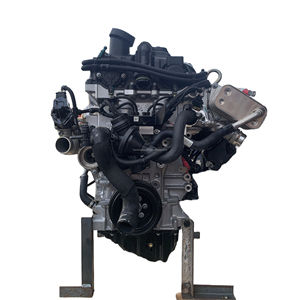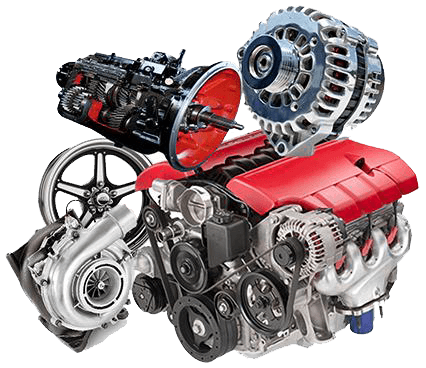Where to Acquire Reliable Import Engines for Any Automobile Design
Where to Acquire Reliable Import Engines for Any Automobile Design
Blog Article
A Detailed Contrast of Various Kinds Of Import Engines and Their Applications in Various Vehicles
As the automobile sector remains to advance, the choice of engines for cars ends up being progressively varied, each offering distinct benefits and applications. From the performance of turbocharged engines to the ecological friendliness of electric powertrains, the spectrum of import engines readily available in today's market accommodates a vast range of driving requirements and choices. Whether it's the torque of a diesel engine or the unconventional design of a rotary engine, understanding the nuances of each kind and just how they straighten with details lorry needs can substantially impact performance, gas economic climate, and general driving experience. By checking out the complexities of these import engines and their applications in different vehicles, a clearer image arises of the complex balance between technology, efficiency, and sustainability in the contemporary auto landscape.
Turbocharged Engines
Turbocharged engines, known for their capacity to enhance power result efficiently, have actually ended up being increasingly prevalent in modern automobile designs. By making use of exhaust gases to drive a wind turbine that compresses incoming air into the engine, turbochargers efficiently raise the amount of air and fuel mixture that can be combusted, resulting in enhanced efficiency without substantially boosting engine size. This modern technology allows producers to scale down engines, causing better fuel performance while maintaining power levels equivalent to larger, normally aspirated engines.

Hybrid Engines
With the developments in engine technology assisting in boosted efficiency and effectiveness, the automobile market has seen a rise in the integration of crossbreed engines as a sustainable remedy for power shipment. Crossbreed engines integrate the benefits of both inner combustion engines and electric motors to provide improved gas effectiveness and minimized discharges. By perfectly switching between both power sources or using them simultaneously, hybrid engines supply adaptability in different driving conditions.

Moreover, hybrid technology is not limited to a details car type, with applications ranging from compact cars to larger SUVs and also high-performance sporting activities cars. As ecological concerns and gas efficiency guidelines become significantly popular, hybrid engines stand for a considerable step towards lasting transportation options.
Electric Engines
Electric engines have actually transformed the auto industry with their environmentally-friendly and efficient power distribution systems. import engines. These engines operate by converting electric power into mechanical power, supplying a smooth and silent driving experience. Unlike typical combustion engines, electrical engines generate zero tailpipe discharges, lowering the overall carbon footprint of automobiles and aiding combat air contamination
Among the key advantages of electric engines is their high power performance, typically converting over 80% of the electric power into propulsion. This efficiency equates right into price financial savings for customers through decreased fuel expenditures. Additionally, electric engines require less maintenance compared to interior burning engines, as they have less relocating parts that can wear gradually.
Electric engines are generally used in electric cars (EVs) and hybrid electric cars (HEVs) EVs depend entirely on electric engines for propulsion, drawing power from rechargeable batteries. On the other hand, HEVs integrate electric engines with conventional interior combustion engines to enhance fuel performance and minimize discharges. The adaptability and sustainability of electrical engines make them an appealing service for the future of transportation.
Diesel Engines
Diesel engines are renowned for their phenomenal fuel performance and robust efficiency in a variety of automobile applications. These engines operate by pressing air important site in the cyndrical tubes, which brings about heats that fire up the injected diesel gas without the demand for spark plugs. This combustion method offers diesel engines with higher torque outcomes compared to gas engines, making them optimal for sturdy lorries like vehicles, buses, and construction tools.
Among the find vital benefits of diesel motor is their premium gas performance, as they can take a trip further on a gallon of gas compared to gasoline engines. This efficiency is particularly advantageous for long-haul transportation and commercial fleets, where reducing gas prices is a substantial variable. In addition, diesel motor are understood for their toughness and durability, requiring less upkeep over their life-span contrasted to gas engines.
In recent times, developments in diesel engine modern technology have actually likewise focused on lowering exhausts to meet stringent environmental regulations. Modern diesel engines are outfitted with advanced exhausts regulate systems, such as diesel particle filters and discerning catalytic reduction, which help decrease contaminants released into the ambience - import engines. These advancements have actually made diesel engines cleaner and more eco-friendly while retaining their effectiveness and performance features
Rotary Engines
Distinguished for their one-of-a-kind design and performance attributes, rotating engines use a distinctive option to typical combustion engine innovations like diesel engines. These engines, additionally known as Wankel engines, operate on a different concept contrasted to conventional piston engines.

Conclusion
In verdict, the contrast of various sorts of import engines highlights the diversity of options available for numerous automobiles. Turbocharged engines provide enhanced power and efficiency, crossbreed engines integrate electric and typical source of power for improved gas economic climate, electric engines provide a tidy and sustainable choice, diesel engines are understood for their toughness and torque, and rotating engines check my site supply a special design with possibility for high performance. Each engine kind has its own strengths and applications in the vehicle industry.
In addition, hybrid engines contribute to a quieter driving experience and often supply a smoother acceleration contrasted to traditional inner combustion engines.
Distinguished for their special design and efficiency qualities, rotating engines offer an unique alternative to standard burning engine innovations like diesel engines. These engines, additionally known as Wankel engines, run on a different concept compared to traditional piston engines. Regardless of these restrictions, rotating engines proceed to attract producers and enthusiasts looking for a different engine modern technology with distinct advantages.
Turbocharged engines use increased power and efficiency, crossbreed engines incorporate traditional and electric power sources for boosted gas economy, electric engines offer a tidy and lasting choice, diesel engines are known for their sturdiness and torque, and rotary engines offer a distinct layout with potential for high efficiency.
Report this page